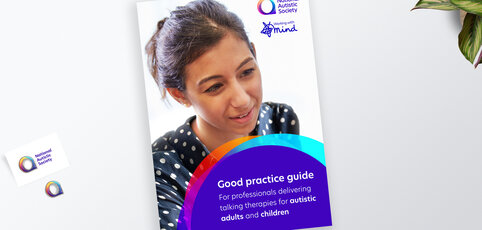Eating disorders - a guide for professionals
An eating disorder is a mental health condition that can affect anyone. Eating disorders can have a significant physical and psychological impact. Although eating disorders are difficult to manage and cope with, the right treatment and support can help. This guide explains more about eating disorders and autism, treatment and support.
What is an eating disorder?
“An eating disorder is when you have an unhealthy attitude to food, which can take over your life and make you ill. It can involve eating too much or too little or becoming obsessed with your weight and body shape. But there are treatments that can help and you can recover from an eating disorder. Men and women of any age can get an eating disorder, but they most commonly affect young women aged 13 to 17 years old.
There are several different types of eating disorder including:
- Anorexia Nervosa (AN): when you try to keep your weight as low as possible by not eating enough food, exercising too much, or both.
- Bulimia: when you sometimes lose control and eat a lot of food in a very short amount of time (binging) and are then deliberately sick, use laxatives (medicine to help you poo), restrict what you eat, or do too much exercise to try to stop yourself gaining weight.
- Binge eating disorder (BED): when you regularly lose control of your eating, eat large portions of food all at once until you feel uncomfortably full, and are then often upset or guilty.
- Other specified feeding or eating disorder (OSFED) – when your symptoms do not exactly match those of anorexia, bulimia or binge eating disorder, but it does not mean it's a less serious illness."
How common are eating disorders in autistic people?
Studies suggest that autistic traits are common in people with eating disorders. Different researchers have reported different rates – they may be anything from 4.7 to 22.9%.
Anorexia is the least common eating disorder for non-autistic people, according to the NHS website, but appears to be the most common eating disorder for autistic people.
What are the physical symptoms of eating disorders?
People with an eating disorder may experience a variety of physical symptoms including:
- dizziness
- exhaustion
- hair falling out
- nails crack/turn yellow
- fast/irregular heartbeat
- hallucinations
- occasional collapses due to tiredness/confusion.
Eating disorders can be extremely difficult to manage and cope with. It is important to get help and support for anyone who might have an eating disorder.
Identification/assessment of eating disorders in autistic people
Autistic people and non-autistic people with eating disorders can show similar difficulties, for example with social situations and flexible thinking. However, autistic people’s motivation behind their eating disorder can often be different. Non-autistic people’s motivation will often be around weight or body image whereas autistic people’s motivation can include:
- not being able to sense a feeling of hunger
- sensory differences related to food textures, smells, tastes etc
- food and counting calories becoming an intense interest/obsession, a tool to manage general anxiety levels
- developing strict routines and rules around food that are very difficult to change.
The impact of eating disorders
Research suggests that eating disorders may have a bigger impact on autistic people than non-autistic people. Autistic people with anorexia experience more difficulties with mental health, social interaction and employment.
Support for autistic people with an eating disorder
If you are caring for an autistic person and you suspect they have an eating disorder, you should take them to their GP to ask for help.
You can also visit our mental health support page for more information about seeking help.
Treatment and support for eating disorders
Although there are no guidelines specifically for treating eating disorders in autistic people, National Institute for Health and Care Excellence (NICE) has produced general guidelines for all children and adults. The guidelines suggest the use of talking therapies and do not recommend the use of medication as a sole treatment.
If you are a professional treating an autistic person with an eating disorder, you may need to adapt your approach. It’s important to talk to your patient and gain an understanding of how things like sensory differences and a need to have a strict routine and conform to rules may play a part in their eating disorder.
Other autistic people who have had eating disorders have discussed their experiences and have suggested the following advice for others:
- ask for help and actively seek support
- maintain social contact with friends and family
- maintain hobbies as a means of distraction from eating
- accept that recovery takes time, sometimes years.
Useful links
Personal accounts
The following accounts may share information and experiences that you may find distressing.







